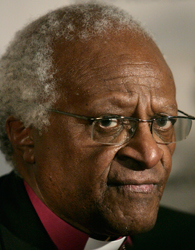Archbishop Desmond Tutu, one of the strongest crusaders for peace in the last century, has fought for equality since he was a young man. After helping to end apartheid in South Africa, he brought his vision to the world. As the first black leader of the Anglican Church in Africa, he was able to broadcast his message of peace and equal freedom for all.
Desmond Tutu’s Early Days
Desmond Mpilo Tutu, was born October 7, 1931, to Aletta Tutu and her husband, school teacher Zacheriah Zililo Tutu. After spending his early years in Klerksdorp, Transvaal, South Africa, Tutu and his family moved to Johannesburg when he was 12.
Tutu’s family lived in a segregated area and Tutu attended a school for black children. He says as a child he began to sense that racial separation was part of a deeply flawed system.
“I recall when I was about nine picking up a tattered copy of Ebony magazine…and it was describing the exploits of Jackie Robinson and how he broke into major league baseball,” Tutu said in 2004. “I didn’t know Jackie, but it helped to exorcise what is the most awful consequence of racial injustice and it is the sense—this demon of self-hate when you have a very low self-esteem.”
Although his deepest wish was to go to medical school and become a physician, Tutu attended teacher’s college at Pretoria Bantu Normal College, where he graduated in 1954. After teaching for a short while, Tutu was struck by the deliberately inferior educational system the South African government required for black students. In his mid-twenties, he quit teaching and began studying to join the priesthood.
Sources in this Story
- Academy of Achievement: Desmond Tutu Interview
- BBC: Desmond Tutu’s Long Crusade
- Nobel Prize: Desmond Tutu
- The History of Apartheid in South Africa
- The Elders
- CNN: Desmond Tutu Fast Facts
Tutu’s Notable Accomplishments
In 1960, Tutu was ordained and for the next few years he worked towards his master’s degree in theology in England. During that time, the South African government strengthened its apartheid policies, forcibly relocating millions of black South Africans. When he returned to South Africa in 1975, Tutu was the first black South African to be selected Dean of St. Mary’s Cathedral in Johannesburg.
Tutu quickly moved up through the religious ranks. He was chosen Bishop of Lesotho in 1976, and in 1978, he became the first black General Secretary of the South African Council of Churches. From this post, he had the authority to speak out in an official capacity against apartheid.
He encouraged a boycott of all goods made in South Africa. This, he believed, would cause an economic downfall and would bring about the end of apartheid. His passport was revoked and he was briefly jailed, but ultimately his calls for nonviolent resistance were heard around the world.
In 1984, Tutu was awarded the Nobel Peace Prize for his work as “a unifying leader figure in the campaign to resolve the problem of apartheid in South Africa.” Although violent protests were breaking out across South Africa, Tutu believed in a peaceful resolution to apartheid.
Continuing to break down racial barriers, Tutu was promoted to the highest position in the African Anglican Church, the Archbishop of Cape Town in 1986. He continued to use his power in the church to call for secular reform.
In 1990, the South African government gave in to mounting international and local pressure and began its first steps towards reform. Nelson Mandela was released from prison after 27 years and racially discriminatory laws began to be overturned. Tutu is believed to have been instrumental in ending the practice of apartheid.
As the country began to rebuild, Tutu was appointed by Mandela to the Chair of the Truth and Reconciliation Commission, which examined the human rights abuses of the previous regime. True to his calling, Tutu continued to advocate cooperation and peaceful resolution between the affected groups.
The Man and his Work
- “No Future Without Forgiveness”
- “God has a Dream: A Vision for Our Time”
- “An African Prayer Book”
- “The Rainbow People of God”
- “God’s Dream”
The Rest of the Story
Several of Tutu’s children have followed in his footsteps. His daughter, Naomi Tutu, founded Tutu Foundation for Development and Relief in Southern Africa and currently is active working for human rights. Mpho Tutu, his other daughter, was ordained an Episcopal priest and founded the Tutu Institute for Prayer and Pilgrimage.
Tutu retired from the position of Archbishop in 1996 and continues to work for the causes he believes in. He helped found The Elders in 2007, a group of world leaders which plans to work on the toughest global problems, including long-standing political conflicts, global medical crises and other challenges. Other Elders include Jimmy Carter, Nelson Mandela and Kofi Annan. He released a children’s book, “Desmond and the Very Mean Word” in 2013, and has been honored with numerous awards.
This article was originally written by Jennifer Ferris; it was updated October 11, 2017.











